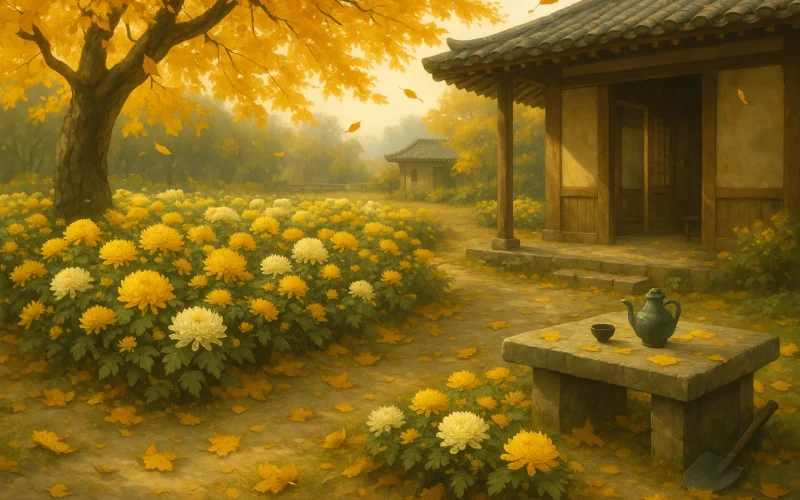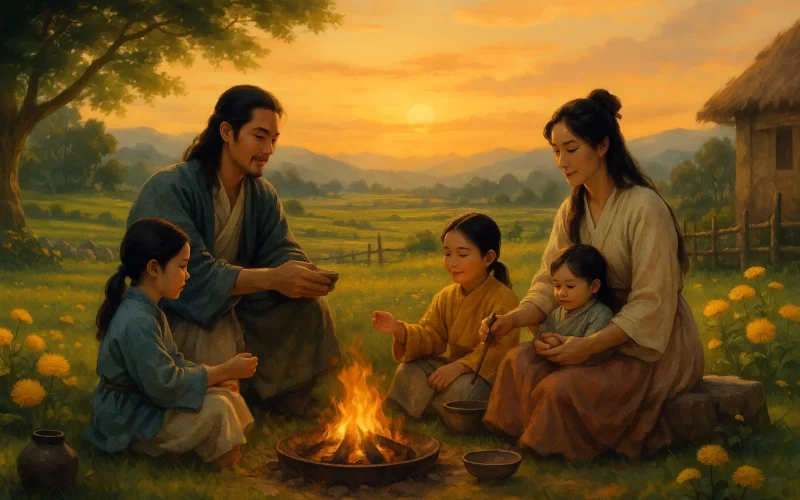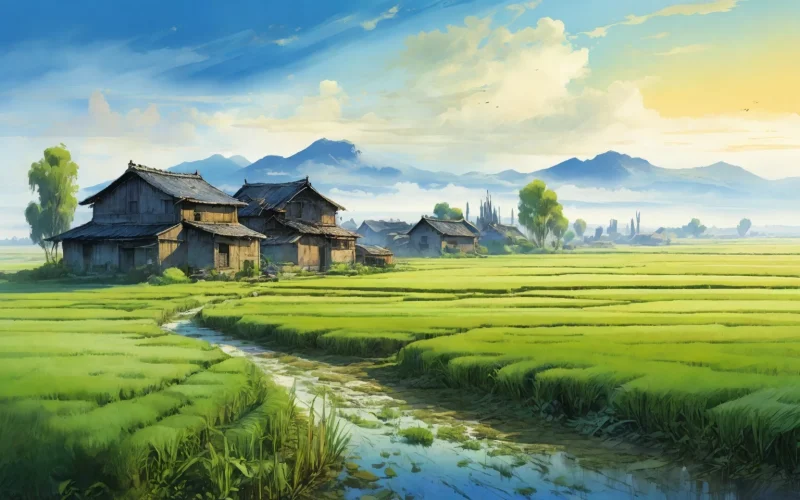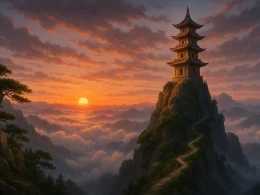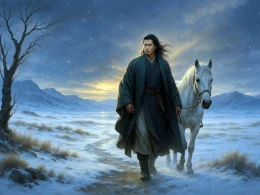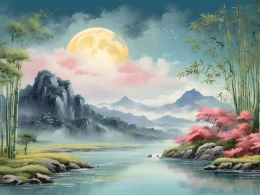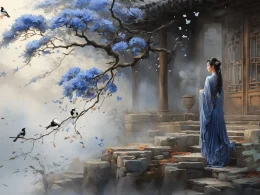Life is short, full of cares and sighs;
On earth men still wish to live long.
In time sun and moon sink and rise
But we like the Double Ninth song.
The wind won’t sough on dreary dew;
The fresh air makes the sky more clear.
Parting swallows leave no shadow new;
Honking wild geese don’t reach the ear.
Drinking may drive all cares away;
Chrysanthemums prolong our life.
Living in thatched cot night and day;
I still neglect the world in strife.
Cups would feel ashamed without wine;
Unenjoyed flowers bloom in vain.
Donning my robe, I croon verse line;
Deep thoughts may lead to joy or pain.
Enjoying solitude with pleasure,
I’m happy in my life of leisure.
Original Poem
「九日闲居」
陶渊明
世短意常多,斯人乐久生。
日月依辰至,举俗爱其名。
露凄暄风息,气澈天象明。
往燕无遗影,来雁有余声。
酒能祛百虑,菊解制颓龄。
如何蓬庐士,空视时运倾!
尘爵耻虚罍,寒华徒自荣。
敛襟独闲谣,缅焉起深情。
栖迟固多娱,淹留岂无成。
Interpretation
This poem was composed in 419 CE or slightly later, when Tao Yuanming was over fifty-five years old. According to the Book of Song·Biography of Tao Qian, after retiring from public life, Tao lived quietly at home. On the Double Ninth Festival (9th day of the 9th lunar month) when chrysanthemums bloomed profusely in his courtyard, he grew melancholy having no wine due to poverty. Suddenly, Wang Hong, then Governor of Jiangzhou, sent him wine. The poet drank joyously and composed this poem to express his feelings. Through seasonal rhythms, natural imagery and traditional festival atmosphere, the work blends life reflections with reclusive mentality, conveying the poet's transcendence over life's brevity and his reverence for spiritual fulfillment.
First Couplet: "世短意常多,斯人乐久生。"
Shì duǎn yì cháng duō, sī rén lè jiǔ shēng.
Life's short yet worries abound; the wise find lasting joy within.
The opening contrasts mundane anxieties with philosophical serenity, establishing the poem's contemplative tone.
Second Couplet: "日月依辰至,举俗爱其名。"
Rì yuè yī chén zhì, jǔ sú ài qí míng.
Sun and moon keep their course; the crowd craves "longevity" in name.
Critiques society's superficial pursuit of longevity amid nature's cycles, with subtle irony toward worldly values.
Third Couplet: "露凄暄风急,气澈天象明。"
Lù qī xuān fēng jí, qì chè tiān xiàng míng.
Chill dew, swift warming winds; crisp air brightens autumn skies.
Typical autumn imagery heightens the Double Ninth Festival's solemn atmosphere, foreshadowing emotional shifts.
Fourth Couplet: "往燕无遗影,来雁有余声。"
Wǎng yàn wú yí yǐng, lái yàn yǒu yú shēng.
Southbound swallows leave no trace; northcoming wildgeese linger in sound.
Symbolizes temporal transitions—the departed past and arriving future—mediating on life's impermanence.
Fifth Couplet: "酒能祛百虑,菊解制颓龄。"
Jiǔ néng qū bǎi lǜ, jú jiě zhì tuí líng.
Wine dispels countless cares; chrysanthemums stall aging's march.
Connects festival customs (wine-drinking, chrysanthemum-admiring) with reclusive ideals of temporal transcendence.
Sixth Couplet: "如何蓬庐士,空视时运倾。"
Rúhé péng lú shì, kōng shì shí yùn qīng.
How can this thatched-roof scholar but watch fortune's decline?
Returns to the poet's impoverished reality, voicing quiet frustration amid societal indifference.
Seventh Couplet: "尘爵耻虚罍,寒华徒自荣。"
Chén jué chǐ xū léi, hán huá tú zì róng.
Dusty wine vessels shame their emptiness; cold blooms glow vainly alone.
"Empty cups amid flowers" metaphorizes life's unfulfilled potentials while affirming unsullied integrity.
Eighth Couplet: "敛襟独闲谣,缅焉起深情。"
Liǎn jīn dú xián yáo, miǎn yān qǐ shēn qíng.
Straightening robes, chanting alone—boundless feelings arise.
Shifts from melancholy to meditation, revealing transcendent serenity through solitary contemplation.
Ninth Couplet: "栖迟固多娱,淹留岂无成!"
Qī chí gù duō yú, yān liú qǐ wú chéng!
Dwelling leisurely brings joys; lingering yields its own fulfillment!
The epiphany: reclusion's quietude constitutes profound existential achievement.
Holistic Appreciation
Using the Double Ninth Festival as temporal framework, the poem contemplates life's transience through seasonal changes and symbolic rituals. Beginning with universal anxiety ("life's short yet worries abound"), Tao develops layered philosophical reflections—contrasting societal longevity pursuits with natural order, then personal poverty with spiritual abundance. The chrysanthemum-wine dichotomy embodies both material lack and moral plenitude. Ultimately, it transcends melancholy through affirming reclusion's quiet triumphs, achieving that quintessential Tao Yuanming equilibrium: sorrow without anguish, serenity without escapism.
Artistic Merits
The poem exemplifies Tao's signature "seasonal meditation" style, fusing nature's rhythms with metaphysical inquiry. Its crystalline language carries profound wisdom through deceptively simple diction. Parallel couplets like
"Southbound swallows leave no trace; northcoming wildgeese linger in sound"
and
"Wine dispels countless cares; chrysanthemums stall aging's march"
create rhythmic elegance with classical grace. Harmonizing Confucian engagement and Daoist detachment, the work neither clings to worldly vanity nor flees reality, instead crafting spiritual transcendence within humble existence.
Insights
This poem offers timeless wisdom: life's brevity and human anxieties demand not nihilism but clarity and conviction. Tao's "chanting alone" and "dwelling leisurely" model a poverty-embracing yet cosmos-containing spiritual posture. Without pretentious detachment or false consolation, he faces reality squarely, harvests tranquility from solitude, and finds sublimity in simplicity—a mentality resonating profoundly in our achievement-obsessed era. His legacy reminds us: true fulfillment lies not in external validation but in inward authenticity aligned with nature's cadence.
Poem translator
Xu Yuanchong (许渊冲)
About the poet

Tao Yuanming(陶渊明), 365 – 427 CE, was a poet, literary figure, fu writer, and essayist active during the late Eastern Jin and early Liu Song dynasties. Born in Chaisang (near present-day Jiujiang, Jiangxi Province), he pioneered a new genre of pastoral-themed literature, expressing profound philosophical insights through simple language. His poetic style became an enduring aesthetic standard in classical Chinese poetry.






